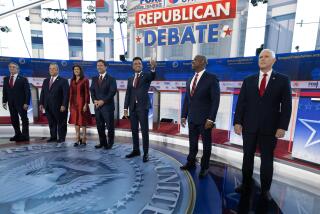Kentucky’s Senate candidate Rand Paul in trouble again
- Share via
Reporting from Washington — -- On Tuesday, Rand Paul was the outsider of the moment. On Friday, he was out in the cold.
Few Republicans jumped to the aid of their party’s Kentucky U.S. Senate candidate as he took heat Friday for questioning tenets of civil rights legislation and, later, defending the oil company at the center of the epic spill in the Gulf of Mexico by saying “accidents happen.”
The silence could hardly come as a shock for a candidate who won his primary Tuesday by promising to tear down the establishment.
But Paul’s base — the “tea party” movement he has embraced and claimed to speak for — was also all but mum. Two leaders declined to claim Paul, the son of libertarian icon Rep. Ron Paul, as a movement spokesman. Others dodged questions about his statements.
“He’s a politician. He doesn’t represent the movement on anything regardless of what he says,” said Mark Meckler, national coordinator for the Tea Party Patriots, an online network for local groups. “He’s a guy running for office.”
As such, Paul has demonstrated a clumsy streak.
In an interview on ABC’s “Good Morning America,” the eye doctor turned candidate said Friday that by lashing out at oil giant BP, President Obama had been “un-American in his criticism of business.”
Eleven people were killed in the explosion that caused a massive leak spewing oil into the waters. Experts have said BP appears to have vastly underestimated the amount of oil flowing into the gulf.
A spokesman for the Republican National Senatorial Committee, the arm of the party charged with helping support Paul’s bid to replace retiring GOP Sen. Jim Bunning, tried to clarify Rand’s remarks.
“Rand Paul was simply making a point that every time an issue arises, the automatic response from the Democrats is not to find out what went wrong and why, but to propose more government, more regulation and more taxes,” Brian Walsh said.
Late Friday, Paul canceled a Sunday appearance on NBC’s “Meet the Press.”
Senate Minority Leader Sen. Mitch McConnell (R-Ky.), who hand-selected Paul’s opponent in the primary, has stayed quiet on Paul’s unconventional remarks this week, which began Wednesday when he appeared to reject portions of the 1964 Civil Rights Act. Paul later said he would have supported the act if he had been in Congress at the time.
McConnell’s spokesman issued a statement saying the senator considers the act a “monumental achievement for the country and is glad to hear Dr. Paul supports it as well.”
Privately, Republicans said Friday that if elected, Paul and his vote would be welcomed into the caucus, but his more controversial views might not.
“Very extreme statements like the one on civil rights won’t be tolerated,” said a former leadership aide, speaking on the condition of anonymity to avoid angering party officials. “He’ll be treated much like Ron Paul is treated in the House — he caucuses with the majority, but they won’t have him on every vote.”
kathleen.hennessey@latimes.com
Lisa Mascaro of the Washington bureau contributed to this report.
More to Read
Sign up for Essential California
The most important California stories and recommendations in your inbox every morning.
You may occasionally receive promotional content from the Los Angeles Times.














